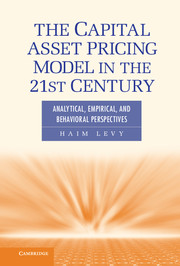 The Capital Asset Pricing Model in the 21st Century
The Capital Asset Pricing Model in the 21st Century Book contents
- Frontmatter
- Contents
- Preface
- 1 Introduction
- 2 Expected Utility Theory
- 3 Expected Utility and Investment Decision Rules
- 4 The Mean-Variance Rule (M-V Rule)
- 5 The Capital Asset Pricing Model
- 6 Extensions of the Capital Asset Pricing Model
- 7 The Capital Asset Pricing Model Cannot Be Rejected
- 8 Theoretical and Empirical Criticism of the Mean-Variance Rule
- 9 Prospect Theory and Expected Utility
- 10 Cumulative Decision Weights
- 11 The Mean-Variance Rule, the Capital Asset Pricing Model, and the Cumulative Prospect Theory
- References
- Name Index
- Subject Index
10 - Cumulative Decision Weights
No Dominance Violation
Published online by Cambridge University Press: 05 June 2012
- Frontmatter
- Contents
- Preface
- 1 Introduction
- 2 Expected Utility Theory
- 3 Expected Utility and Investment Decision Rules
- 4 The Mean-Variance Rule (M-V Rule)
- 5 The Capital Asset Pricing Model
- 6 Extensions of the Capital Asset Pricing Model
- 7 The Capital Asset Pricing Model Cannot Be Rejected
- 8 Theoretical and Empirical Criticism of the Mean-Variance Rule
- 9 Prospect Theory and Expected Utility
- 10 Cumulative Decision Weights
- 11 The Mean-Variance Rule, the Capital Asset Pricing Model, and the Cumulative Prospect Theory
- References
- Name Index
- Subject Index
Summary
Introduction
From the discussion of the observed experimental choices in the laboratory, particularly from the Allais paradox (see Chapter 9), it is obvious that, at least in some cases, people employ decision weights (DWs) rather than objective probabilities. However, as we demonstrated in Chapter 9, although the employment of DWs may resolve some expected utility paradoxes, it may create other paradoxes, such as First-degree Stochastic Dominance (FSD) violation. This implies a rejection of the monotonicity axiom, implying that a person may prefer less wealth than more wealth, an unacceptable situation. Thus, the expected utility model reveals some paradoxes and the Prospect Theory (PT) model may violate FSD. Therefore, a more satisfactory model that avoids the two types of paradoxes is needed.
With respect to the FSD violation, one must distinguish between a predicted FSD violation, obtained with a theoretical model, and an experimentally or an empirically observed FSD violation. The observed experimental or empirical FSD violations may be induced by two factors: DWs and bounded rationality. The DWs’ effect on FSD violations, in PT framework, is discussed in Chapter 9. The bounded rationality FSD violations may be due to the complexity of the prospects under consideration; that is, people cannot comprehend the complicated distributions of rates of return of the two prospects under consideration and hence do not select rationally among the various prospects. In this chapter, we discuss these two sources of potential FSD violations. However, one should keep in mind that a violation of FSD in choices induced by bounded rationality might exist regardless of whether objective probabilities or DWs are employed. Thus, DWs and bounded rationality may join forces, operating in the same direction and resulting in an FSD violation.
- Type
- Chapter
- Information
- The Capital Asset Pricing Model in the 21st CenturyAnalytical, Empirical, and Behavioral Perspectives, pp. 333 - 371Publisher: Cambridge University PressPrint publication year: 2011


